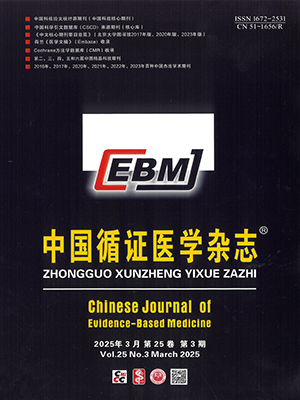Objective To evaluate and select essential medicine for acute bronchitis using evidence-based methods based on the burden of disease.
Methods By means of the approaches, criteria, and workflow set up in the second article of this series, we referred to the recommendations of evidence-based or authority guidelines from inside and outside China, collected relevant evidence from domestic clinical studies, and recommended essential medicine based on evidence-based evaluation. Data were analyzed by Review Manager (RevMan) 5.1 and GRADE profiler 3.6 to evaluate quality of evidence.
Results (1) Eight guidelines were included (seven foreign guidelines, one domestic guideline; five based on evidence, three based on expert consensus). (2) A result of six RCTs (n=816, low quality) indicated that pentoxyverine had efficiencies of 53% to 82% for cough relief. Among the six RCTs, a result of three RCTs (n=283) indicated that pentoxyverine was slightly less efficient than procaterol (RR=0.86, 95%CI 0.78 to 0.94, P=0.001); a result of two RCTs (n=233) indicated that pentoxyverine was slightly less efficient than Chinese medicinals decoction (RR=0.82, 95%CI 0.74 to 0.91, P lt;0.001). Adverse reaction of pentoxyverine (incidence: 0% to 2.4%) mainly covered nausea, palpitation, etc. Pentoxyverine cost 0.20 yuan (for adult) or 0.08 yuan (for child) daily, which was orally taken and applicable to the target population. (3) A result of six RCTs (n=403, low quality) indicated that the efficiencies of dextromethorphan for cough relief was 47.0% to 95.3%. Among the six RCTs, a result of one RCT (n=283) indicated that dextromethorphan hydrobromide (nasal drop) was more efficient than blank intervention (RR=3.71, 95%CI 1.91 to 7.21); a result of one RCT (n=43) indicated that dextromethorphan (for oral use) was more efficient than placebo (RR=1.74, 95%CI 1.13 to 2.66); a result of one RCT (n=300, moderate quality) indicated that dextromethorphan was more efficient than pentoxyverine (RR=1.16, 95%CI 1.07 to 1.26); a result of one observational study (n=121, low quality) indicated that dextromethorphan given for 5 days had an efficiency of 66.5%. Adverse reaction of dextromethorphan (incidence: 2% to 30%) mainly covered mouth dryness, dizziness, nausea, etc.
Conclusion (1) We offer a b recommendation for dextromethorphan used in relieving dry cough due to acute bronchitis. (2) We offer a weak recommendation for pentoxyverine as symptomatic treatment for cough relief. (3) We make a recommendation against antibiotics, β2-agonist bronchodilators and mucolytic agents as routine use. (4) More large-scale, multi-center, double-blinded RCTs are needed in clinical and pharmacoeconomic studies of acute bronchitis in hopes of producing high-quality local evidence.
Citation: WANG Yingqiang,LI Honghao,LI Youping,LI Cuicui,WANG Li,YANG Xiaoyan,SHEN Jiantong,LI Xiao,LI Xianglian. Evidence-Based Evaluation and Selection of Essential Medicine for Township Health Centre in China: 5. Acute Bronchitis. Chinese Journal of Evidence-Based Medicine, 2012, 12(8): 888-894. doi: 10.7507/1672-2531.20120144 Copy
Copyright © the editorial department of Chinese Journal of Evidence-Based Medicine of West China Medical Publisher. All rights reserved
-
Previous Article
Evidence-Based Evaluation and Selection of Essential Medicine for Township Health Centre in China: 4. Acute Exacerbation of Chronic Bronchitis -
Next Article
Evidence-Based Evaluation and Selection of Essential Medicine for Township Health Centre in China: 6. Community-Acquired Pneumonia




